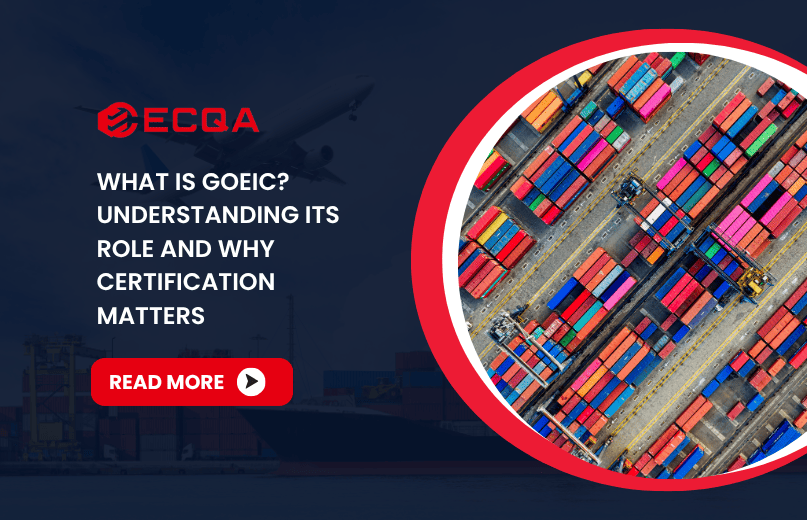
Understanding GOEIC Certification Requirements

The General Organization for Export and Import Control (GOEIC) is a vital governmental body operating under Egypt’s Ministry of Trade and Industry. It plays a central role in regulating, inspecting, and controlling imports and exports to and from Egypt. GOEIC is tasked with ensuring that traded goods meet the country’s technical specifications, health and safety standards, and quality benchmarks.
By performing rigorous testing, inspection, and certification, GOEIC aims to protect the Egyptian market from substandard goods, safeguard consumer health and safety, and encourage fair trade.
GOEIC’s Core Responsibilities
1. Trade Facilitation and Export Development
GOEIC plays a central role in promoting Egypt’s export competitiveness and improving trade efficiency. The agency works to eliminate procedural bottlenecks, especially for small and medium-sized exporters, by simplifying regulations and providing technical guidance. Through its network of export support services, GOEIC enhances access to global markets while safeguarding the interests of Egyptian industries.
2. Inspection, Testing, and Laboratory Oversight
GOEIC manages a nationwide system of accredited laboratories, ensuring reliable testing of a wide range of imported and exported goods. These laboratories operate under ISO/IEC 17025 accreditation, offering high-precision analytical capabilities for categories such as:
- Food and beverages
- Electrical and electronic goods
- Chemicals and detergents
- Construction materials
For a detailed breakdown of inspection categories for Egyptian imports, see the key product types subject to GOEIC regulation and testing.
The organization continuously updates its equipment and methods to meet international standards, reinforcing Egypt’s credibility in cross-border trade. It also conducts routine technical training for inspection and lab personnel to maintain testing accuracy and procedural integrity.
3. Registration and Certification Control
To ensure full compliance with national regulations, GOEIC requires formal registration of exporters, importers, production facilities, and inspection bodies. This registration process is critical for:
- Customs clearance eligibility
- Traceability and product accountability
- Market access authorization
In addition, GOEIC issues Certificates of Conformity (CoC) for regulated products. These certificates are mandatory for many goods entering Egypt and serve as official proof that shipments meet Egyptian technical and safety standards. Pre-shipment inspection and verification may be conducted either at the country of origin through approved agencies or upon arrival at Egyptian ports.
4. Enforcement of International Trade Agreements
GOEIC ensures Egypt’s compliance with a range of regional and bilateral trade agreements, including:
- COMESA – Common Market for Eastern and Southern Africa
- GAFTA – Greater Arab Free Trade Area
- EU–Egypt Association Agreement
The agency monitors rules of origin, product conformity, and regulatory equivalence to ensure that goods traded under preferential agreements meet all required conditions. This oversight supports Egypt’s commitment to transparent and rules-based trade partnerships.
5. Market Surveillance and Consumer Protection
GOEIC conducts post-market surveillance to identify non-compliant or unsafe products already in circulation. In partnership with Egypt’s consumer protection authorities, it inspects items for mislabeling, expired ingredients, or non-conformance to declared standards. Any product that fails to meet legal or safety requirements is subject to withdrawal, recall, or legal action—reinforcing both consumer safety and market credibility.
6. Digital Governance and Quality Systems
In support of Egypt’s broader digital transformation agenda, GOEIC has implemented a range of technology driven solutions. These include:
- Online registration and certification platforms
- Integrated inspection databases
- Automated reporting systems
The agency is focused on building data driven, paperless processes that reduce transaction time, improve transparency, and support real time decision making across inspection, testing, and trade clearance functions.
7. Institutional Development and Administrative Efficiency
GOEIC invests in continuous staff development and performance management across all departments. It prioritizes capacity building in technical areas, foreign languages, digital systems, and international trade regulations. At the administrative level, the agency follows modern resource management standards , ensuring cost effective operations, preventive maintenance of facilities, and strict internal monitoring of procedural compliance.
Benefits of GOEIC Certification
Obtaining GOEIC certification provides exporters, importers, and manufacturers with more than just regulatory compliance. It offers a structured pathway to access the Egyptian market, reduce shipment delays, and build trust with local authorities and consumers. For businesses seeking long term market stability and operational efficiency, certification through GOEIC delivers measurable advantages.
1. Faster Customs Clearance
GOEIC certified shipments are more likely to pass through Egypt’s ports without unnecessary delays. When goods are supported by valid CoC, approved test reports, and pre registered factory documentation, customs officers can process clearances more efficiently, reducing dwell times and port storage costs.
2. Legal Market Entry
Certain product categories cannot legally be imported into Egypt without GOEIC approval. Certification ensures compliance with national laws, including product specific safety, labeling, and technical standards. It serves as an official authorization for product placement in the Egyptian market, minimizing the risk of seizure, rejection, or penalties.
3. Enhanced Trade Credibility
Holding a valid GOEIC certification enhances a company’s credibility with Egyptian buyers, distributors, and regulatory authorities. It signals a commitment to quality, transparency, and compliance, qualities that are increasingly important in both B2B and B2C transactions.
4. Risk Reduction and Regulatory Predictability
Companies with GOEIC certification are less likely to face unexpected scrutiny or post clearance audits. A clean compliance record often qualifies exporters for reduced inspection frequency under Egypt’s risk based clearance model. This allows businesses to manage logistics timelines with greater certainty and lower operational risk.
5. Streamlined Market Access for High Risk Products
For sensitive goods such as food, cosmetics, medical items, and electrical appliances, GOEIC certification is essential. By undergoing pre-shipment inspections and laboratory testing in advance, businesses avoid last minute complications and gain access to markets with strict safety and quality controls.
6. Alignment with International Standards
GOEIC certification is based on Egyptian and international standards (such as ISO, IEC, Codex Alimentarius), making it compatible with broader compliance frameworks. This alignment supports companies operating in multiple markets, helping them consolidate product compliance strategies and reduce duplication in testing or documentation.
7. Protection Against Counterfeiting and Unlawful Competition
Certification acts as a first layer of defense against counterfeit goods and unregistered competitors. By ensuring that only compliant and verified products enter the market, GOEIC supports fair competition and helps certified suppliers protect their market share from low quality or fraudulent imports.
In summary, GOEIC serves as the essential gateway to accessing the Egyptian market. Full compliance not only ensures legal entry but also offers strategic advantages including faster customs clearance, reduced operational risks, and stronger market credibility. For businesses aiming to trade successfully in Egypt, understanding and aligning with GOEIC requirements is a critical step toward sustainable growth.
Ready to expand into Egypt? Contact ECQA today to secure your GOEIC compliance and streamline your market entry.

 Request Free Sample Report
Request Free Sample Report